Rye Barcott's Blog, page 15
April 14, 2015
Life-Changing Impact: CFK Supporter, Matt Grespin, Reflects on His Visit to Kibera
Spring is a time as good as any to reflect on the unpredictable twists and turns that have shaped us and how we see the world. It occurs to me that there are a few formative experiences in all of our lives that are the seeds from which all understanding grows. My experience with CFK and the interactions I’ve had with the individuals attached to the organization have served as seeds for me.
My first introduction to CFK was in 2003 when I was an undergraduate student at James Madison University (go Dukes!) participating in an anthropology field course in Kenya. At that time, CFK was a much smaller and newer organization. Although we spent only one day in Kibera on our trip, and less than a day specifically visiting CFK, the experience left an indelible mark on me.
Growing up, I was fortunate to visit many areas of the United States and countries abroad. But I had never seen anything like Kibera or met anyone like its residents or those who worked in the Tabitha Medical Clinic (though it was the Rye Medical Clinic then). I remember being 20 years old and amazed that people in Kibera had wildly different attitudes towards life, ranging from hope and enthusiasm to general frustration and abject resignation. It was similarly astounding that there could be hope, enthusiasm, and such a rich, communal spirit at all in a place that seemed difficult to the point of being unlivable. How could so many people have such a positive attitude, be so welcoming, and keep the faith so consistently?
Of course, I know now that any and all of these attitudes can be found everywhere, from shanties and tent cities to suburbs and mansions throughout the world. Back then, it was the first time I made that discovery, and it was strange and exciting. Prior to that, I was a well-intentioned but uninformed kid who thought he understood the world because he had gone on a few trips, watched some movies, and taken a few classes. Speaking with the individuals associated with CFK and visiting Kibera led me to radically question the world I thought I knew. That experience also helped push me towards pursuing development and public health instead of medicine in a traditional sense, a decision I have never regretted.
The primary mission of CFK is, of course, to empower and enable those within Kibera to lead happier, healthier, and more fulfilling lives. However, an important secondary function of CFK is to raise awareness of the many issues faced by those living in Kibera and places like it throughout the world. By extension, CFK encourages dialogue around what the causes of and potential solutions to those issues might be. What historical circumstances have led to the formation of places like Kibera? Based on those, what will the evolution of Kibera and similar communities look like going forward? Perhaps most importantly, how can we learn from both the negative and positive experiences of those within Kibera in order to shape our own understanding of poverty and make strides to improve upon it?
The impact of CFK on those living in Kibera is profound, but it does not stop there. Like many who have had an opportunity to visit Kibera through CFK, or even to meet its staff and volunteers at universities or fundraising events elsewhere, I count myself as someone upon whom CFK has had a life-changing impact. My first encounter with CFK in Kibera and their ongoing work continues to shape my view of the world and of all that can be accomplished through dedication, empathy, and compassion. In that sense, its reach has extended and continues to extend far beyond the borders of Kibera, Nairobi, and Kenya.
Today, over a decade after my first and only visit to Kibera, I still follow CFK, including this blog, with enthusiasm. The degree to which CFK and its staff and volunteers can affect positive change for so many of those living in Kibera is truly amazing. It is wonderful and inspiring to see great people working with one another even though they are at times separated by an entire world.
April 8, 2015
Scoring for Sanitation, Part 2: Stella and Paul Reflect on Soccer and Hygiene
Remember our blog post from last month about WASH United’s Challenge Cup soccer tournament? To refresh your memory, teams from Carolina for Kibera’s Sports Association traveled across Nairobi to play in a friendly tournament with other organizations. In the end, CFK teams in the under 10 and 14 categories took first place!
But the event was more than just a soccer tournament. It also served as a unique learning opportunity, mixing sports with important health lessons. WASH United, the sponsor and organizer of the tournament, believes that access to clean water and sanitation is a basic human right. Before the games began, a couple of Community Health Volunteers with whom CFK works led workshops on the importance of proper hygiene for all the teams.
The event was a powerful experience for all of the athletes. Recently, we got the chance to catch up with Stella and Paul, two 14-year-olds who enjoyed the opportunity to learn about personal health and safety while doing something that they love to do. “I really enjoyed the WASH Challenge Cup because it was not just playing, but also learning about sanitation and hygiene,” said Paul. “Now I can teach my friends at school and my family at home about why it’s important.”
Stella was excited not only to play and learn about important health topics, but also to play in a different environment. “I thank CFK for the opportunity to travel outside Kibera not only to play soccer but also to learn about hand-washing.” Paul echoed her sentiments, saying, “I have never participated in an event like this because we usually play in our community. But Carolina for Kibera helped me and my teammates play outside of Kibera, where we made good friends after playing together.”
Between taking a trip outside Kibera, learning about personal hygiene, and taking home the trophy, the WASH United Challenge Cup was a wonderful experience for everyone who participated. And the athletes are eager to tell people what they’ve learned! Below, check out a video of Stella recounting the most thorough way to wash your hands.
April 2, 2015
The Rain in Kibera
By: Leann Bankoski, CFK Executive Director
This week marked my second month of a three-month stay in Kenya. It feels as if I learn something new about the challenges and potential of the Kibera community every day. Sometimes the lessons come in unexpected ways.
—
This week, the rainy season started in Kenya, or as they say locally, “The rains have arrived.”
As I lay in bed Sunday night listening to the rain falling heavily, I couldn’t help but think of Kibera. In my well-built apartment, the rains were loud and cold. I imagined the noise and dampness that the rain would bring for all our friends living in makeshift shacks in Kibera.
Living in Kibera during the dry and hot season is a challenge. With the rain, it seems almost impossible. Ditches filled with sewage overflow into the streets, more people fall ill, children have nowhere to play, every path turns from dirt to deep, sticky mud, and laundry is perpetually wet.
On Monday morning as I arrived at the office, I was feeling overwhelmed by the idea of what rain does to Kibera. I made an offhand comment to Salim, “Isn’t it just terrible? The rain makes everything harder, everything is worse.” He paused a moment and thoughtfully replied, “Yes, there is more mud. But look at the houses, look how it has washed them clean. Kibera is beautiful after the rain.”
I was speechless.
But he’s right. Poverty is hard. Kibera is hard. Perhaps the rain makes it a little harder, but we can’t live without it. We need rain. Though I can’t imagine living in Kibera during the rainy season, Kiberans have found, as they always do, a way to survive…even thrive. They are eternally resilient.
And now I’m trying to remember the lesson Salim offered. Each day, we are offered a fresh start. And much like after a rain, we can choose to see brokenness or see beauty. I am grateful and inspired by our staff and volunteers (which together number almost 300 people!) who see the beauty and potential of this community and show up every day, rains or no, to make it a better place. No one can stop the rains from coming to Kibera…but everyone can do something to help. We can see the beauty after the rain.
March 20, 2015
We Rise or We Fall Together
By: Leann Bankoski, CFK Executive Director
–
In late January, I landed in Nairobi for a three-month stay. Typically, when I visit Kenya, it’s only for 1-2 weeks, so the idea of being here for a full 3 months is exciting! Inevitably, when I tell people about my stay, they often ask, “What is it like to be in Kenya for longer?” The lessons I’ve learned about the Kibera community are too many to count, so I’ll leave you with 2 takeaways:
The work happening in Kibera is life-changing!
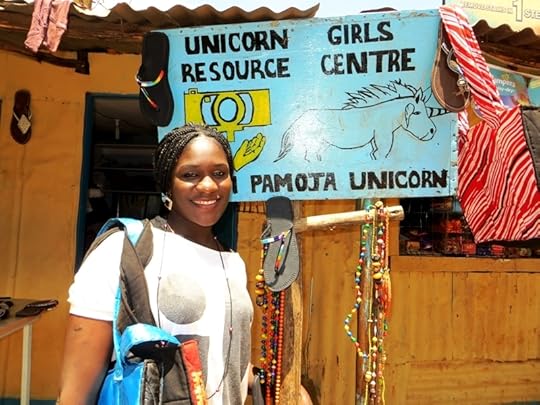 Last Wednesday afternoon, I ordered a pair of custom-designed, handmade sandals from Petit. Petit has been a part of CFK since 2002. She joined the Sports Association first, then began attending meetings for the Daughters United Program. With the birth of her daughter, Wendy, she became a mother at the age of 16. Petit continued to be involved in CFK, building her leadership skills and actively giving back to the community as an alumni leader. She has always been keenly aware of the unique challenges young mothers like herself face. Recently, Petit decided she wanted to start her own girls’ center for young mothers. When she was presented with the opportunity to launch the center through a small grant from CFK, Petit seized it and opened the Unicorn Girls Resource Center, a place of support for extremely marginalized young girls, including those who are young mothers like her. 6 years ago, I recall meeting her and thinking she was sassy, young, and full of personality, just as she is now. Today, I see Petit as a remarkable leader and role model. And the sandals she makes are beautiful!
Last Wednesday afternoon, I ordered a pair of custom-designed, handmade sandals from Petit. Petit has been a part of CFK since 2002. She joined the Sports Association first, then began attending meetings for the Daughters United Program. With the birth of her daughter, Wendy, she became a mother at the age of 16. Petit continued to be involved in CFK, building her leadership skills and actively giving back to the community as an alumni leader. She has always been keenly aware of the unique challenges young mothers like herself face. Recently, Petit decided she wanted to start her own girls’ center for young mothers. When she was presented with the opportunity to launch the center through a small grant from CFK, Petit seized it and opened the Unicorn Girls Resource Center, a place of support for extremely marginalized young girls, including those who are young mothers like her. 6 years ago, I recall meeting her and thinking she was sassy, young, and full of personality, just as she is now. Today, I see Petit as a remarkable leader and role model. And the sandals she makes are beautiful!
The world is small.
On February 10th, I got an email alert from UNC about 3 students that were murdered near campus. I was in shock. I felt so far from the UNC community and blindsided by such a senseless tragedy. My husband and I followed the news, but it wasn’t the same as being in North Carolina to mourn alongside colleagues and friends. And then something unexpected happened. The CFK Kenya staff said they’d heard about the murders and they too were heartbroken. I have found such comfort in knowing that my colleagues here in Kenya ache with this tragedy as much as my colleagues in NC.
Time zones separate us, but our shared humanity makes the world small. It’s become increasingly clear to me that even as we try to distinguish and divide ourselves from one other—in the end, our destinies are bound. We rise or we fall together.
March 12, 2015
Bright, Ambitious, and Headed to High School
By: Scott Weathers, CFK Volunteer
Last month, 25 Kibera students were awarded high school scholarships after an intense application process. With 110 students applying this year, CFK’s scholarship process was almost as competitive as undergraduate admissions at UNC-Chapel Hill, where CFK’s U.S. office is located (based on acceptance percentage CFK 22%; UNC 29%).
When considering who should be awarded a scholarship, CFK carefully weighs financial need with high academic and personal standards. In their applications, students shared personal essays, test scores, and grades, which were evaluated by multiple CFK staff members. From there, 40 students underwent panel interviews led by 4 of CFK’s staff designed to assess English language skills, interpersonal skills, and future aspirations.
And the results show! The recipients are bright students at the top of their class who share a desire to improve their community and aspire to become everything from future doctors to engineers. Not only are these some of the best students in Kibera, but they are also diverse. Despite receiving far more applicants from boys than girls, CFK’s Education Program selected 13 girls and 12 boys, based on the quality of their interviews, and the fact that providing education for girls benefits the entire community in major ways (Press Release, World Bank). The chosen students also come from various neighborhoods across Kibera, representing many different ethnic groups and both Christianity and Islam.
During the interviews, students often commented on how they would improve their community and create change for themselves and their neighbors. One particularly inspirational young woman, Rebecca, elaborated on her dream of founding a reproductive health clinic for girls. Several other girls plan to become journalists, holding up Kenyan news anchor, Julie Gichuru, as their role model.
Interviewers also commented on the sense of personal integrity of the candidates, regardless of their outcome in the process. One memorable interview came from a student who was not awarded a scholarship. After asking the student why he thought he deserved a scholarship, he simply responded, “I don’t.” Seeing the need for scholarships among students in the waiting room, he argued that others deserved the money more than he did.
Reflecting on the impressive stories and personal goals shared during the application process, it’s easy to reaffirm a core belief of CFK—talent is universal, opportunity is not. Over the next 4 years, 25 adolescents will grow, learn, change themselves, and change their communities, as all students should.
From Hospital to Household
By: Mark Muasa, Head of Health Services Department, and Yunus Mohammed, Community Outreach Project Officer
In Kibera, it’s a no-brainer that lacking access to adequate healthcare can be life-threatening—and for young mothers, women of childbearing age, and children younger than 5, this is especially true. Often, reproductive health services in Kibera are portrayed as damaging or untrustworthy, which discourages people who need treatment from seeking it out. And when those services are out of reach due to time, cost, or distance, seeking treatment or advice can feel hopeless.
Seeking treatment should not feel hopeless. There is an urgent need to combat health misinformation and close the gap—physical and mental—between community members and accessible medical care. That’s exactly what CFK aims to do through our renewed collaboration with Ronald McDonald House Charities (RMHC). The new RMHC-funded project intends to build upon CFK’s network of Community Health Volunteers (CHVs) in order to spread accurate and reliable health information to Kiberans. Over the next 2 years, CHVs will focus on maternal and child health, improving awareness of and access to antenatal care, family planning methods, and immunization and vaccines for children, among other things.
To do this, CFK has partnered with another organization, Curamericas Global—an organization dedicated to bringing health to underserved communities worldwide—to train and support Community Health Volunteers responsible for bringing this information to average community members. Curamericas Global Program Manager, Florence Amadi, has already visited Kibera—twice now—to run workshops for staff and CHVs!
From there, CHVs will follow the Train-the-Trainer (TTT) model to reach community members with accurate health information and advice. The model has 3 tiers: first, a medical professional provides training and support for staff and volunteers. Then, CHVs conduct door-to-door visits at their peers’ homes in Kibera to deliver that health information to others, to screen household members, and provide basic services and referrals if necessary. CHVs are also residents of Kibera. As such, they are trusted by their friends and neighbors, which makes it easier for them to dispel preconceived notions about health and replace them with accurate information.
Through this model of “cascading” information, CFK is aiming to tackle maternal and child health issues—and misinformation about them—in Kibera. By taking proper information and services from hospital to household, we hope to ensure access to health services for thousands of Kiberan residents. With support from RMHC and Curamericas, the whole project will educate and encourage women of childbearing age to make use of vital health services for themselves and their children.
Scoring for Sanitation: CFK Soccer Teams Participate in WASH United’s Challenge Cup
By: Kennedy Juma, Sports Association Program Officer
Want to know a secret about working with youth? They are some of the best advocates for positive change in a community like Kibera. But to get them engaged, you first have to get their attention through something they love doing. For many youth in Kibera, this means soccer!
On the surface, soccer may seem like just a sport. In reality, lessons about teamwork and collaboration learned through soccer have the power to unite different communities. Soccer also has the power to start conversations on how to improve various aspect of those communities. Over the past couple of years, one topic of civic engagement that CFK has been focusing on has been basic water, sanitation, and hygiene (WASH) in Kibera.
Lack of access to safe drinking water, which leads to poor sanitation and hygiene, forms the basis of a vicious circle of poor health, lost life, lost opportunities, and poverty that prevents millions of people around the world from reaching their full potential. This is especially true in Kibera, where water is expensive—8 times more expensive than it is in Nairobi proper, to be exact—and even then is not necessarily safe to drink. Over the past year, with support from Ronald McDonald House Charities, CFK has worked with community volunteers to set up easy-to-use hand-washing stations in Kiberan households and has developed a promotional campaign on the benefits of proper sanitation and hygiene.
Reaching youth about these topics helps stop the cycle. Making these lessons and workshops fun makes youth even more excited adopt healthy hygiene habits every day. So what better way to teach kids about sanitation and hygiene than before soccer matches? In February, 10 teams from CFK’s Sports Association participated in the WASH United Challenge Cup, a tournament organized by WASH United, an organization that believes that access to clean water and sanitation isn’t charity but a basic human right. In addition to CFK, the tournament brought together athletes from peer organizations Vijana Amani Pamoja (VAP) and Mathare Youth Sports Association (MYSA) who also use soccer to teach healthy habits to youth. VAP and MYSA helped WASH United host the event as well.
 Before the tournament began, soccer coach, Susan Mueni, and Community Health Worker, Francis Odera, led workshops and games for all the athletes focused on WASH health facts. The
Before the tournament began, soccer coach, Susan Mueni, and Community Health Worker, Francis Odera, led workshops and games for all the athletes focused on WASH health facts. The 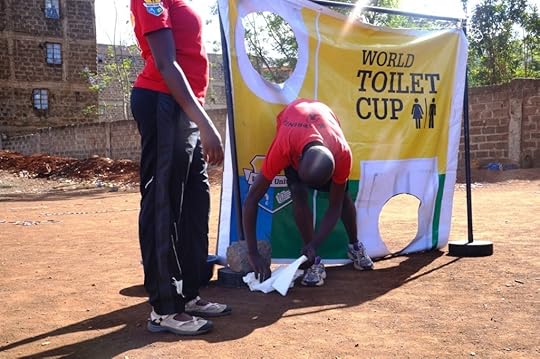 tournament’s crowd—which included children from local primary schools, young mothers who had stopped by, and members of CFK’s jump rope team—wanted to participate in the workshops as well! In total, we reached 350 kids and their parents.
tournament’s crowd—which included children from local primary schools, young mothers who had stopped by, and members of CFK’s jump rope team—wanted to participate in the workshops as well! In total, we reached 350 kids and their parents.
In all, the tournament was a great success in spreading information on proper sanitation and hygiene practices. The icing on the cake? CFK’s teams emerged victors in both the under 10 and 14 categories, beating VAP’s and MYSA’s teams on their own turf! Though CFK’s teams left with trophies, everyone left the tournament knowing the importance of proper hygiene and now have additional knowledge of how to keep themselves safe from preventable disease—knowledge and habits that ultimately save lives.
February 27, 2015
Building Better Futures from the Ground Up
Starting from scratch is never easy, especially when opening a business or any other income-generating enterprise. Rebeccah and Josephine, both small business owners in Kibera, learned this quickly after setting up shop in Kibera.
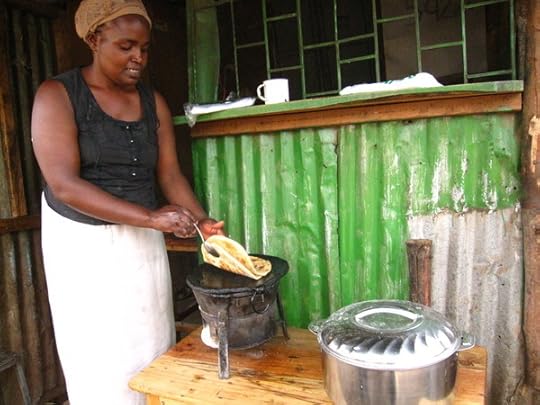 Rebeccah – Mama Chapo
Rebeccah – Mama ChapoRebeccah grew up in Nyamira County, Kenya, a rural area near Lake Victoria that she describes as “very underdeveloped” and without infrastructure. When she moved to Kibera, she decided to begin working towards her long-term goal to open a restaurant. Rebeccah knew she had to start small; at the moment, she owns a chapati shop called Mama Chapo (chapati is a flatbread made from wheat flour that is a staple side dish in Kenyan cuisine). “I started this business 4 years ago to sustain my family,” she says, proudly. “I plan to have a restaurant after growing my chapati business.”
Over the past 4 years, Rebeccah says her biggest challenge is finding enough capital to really make progress towards saving for her restaurant. In order to get some ideas, she reached out to staff at CFK. Rebeccah first got involved with CFK as a Community Health Worker (CHW), assisting with health outreach projects that CFK organized. When other CHWs in CFK connected her to the Economic and Entrepreneurship Department, she took the opportunity to ask the CFK staff for ideas about how to help her business grow.
That’s how she learned about Kiva Zip, an online micro-lending platform that connects entrepreneurs in search of a micro-loan directly with lenders from all over the world. CFK acts as a trustee for local entrepreneurs like Rebeccah by endorsing them and their business. Since July of 2012 (when CFK entered into partnership with Kiva), CFK-endorsed entrepreneurs, including Rebeccah, have re-paid 95% of loans successfully. Through her loan, Rebeccah has begun offering service for MPESA, a Kenyan company that allows money transfers over mobile devices to supplement her income from chapati sales.
Josephine – Pambo Boutique
![Josephine_Pambo [cropped]](https://i.gr-assets.com/images/S/compressed.photo.goodreads.com/hostedimages/1425104027i/13846135.jpg)
Josephine’s story is similar. She grew up in the Nairobi neighborhood of Jamhuri and is no stranger to city life. She says that her focus is simply to give her 4 children a good education. Josephine owns a fashion boutique called Pambo, where she sells handbags and women’s dresses made with patterned fabric called kitenge. The store provides her family’s main source of income, which can be challenging since business isn’t always steady. “My biggest challenge is that the business tends to be seasonal,” she admits, “so my immediate goal is to diversify my stock.”
Also a CHW, Josephine heard about Kiva Zip in the same way as Rebeccah. Volunteering as a CHW helped connect Josephine to friends, fellow community members, and more customers. Through her Kiva Zip loan, Josephine has added clothes and shoes to her assortment of products, in an effort to cater to different groups of people. In this way, she can ensure that she has something for everyone throughout the year.
Both women feel that taking out loans and expanding what they offer to customers have improved their immediate lives greatly, while they have also helped them take the next step towards achieving their long-term goals. Rebeccah and Josephine know that building their futures is difficult when doing so from the ground up, but with support from Kiva Zip, CFK, and others in their community, they are building them brick by brick.
February 5, 2015
Strengthening Health through Community Participation: Curamericas Global Visits Kibera
[Note: a version of this article originally appeared in the Fall 2014 edition of Grassroots, Curamericas Global's print newsletter. You can find a link to that newsletter here.]
For the past two years, Carolina for Kibera has partnered with Curamericas Global and Ronald McDonald House Charities to reduce child mortality from preventable diarrheal disease by creating a health system that is managed and owned by the community. Over these two years, Curamericas Global has provided technical assistance in the form of training and capacity-building for staff through the Community-Based Impact-Oriented (CBIO) and Care Groups (CG) methodology for community-based healthcare.
In September, Program Manager Florence Amadi facilitated several Train-the-Trainer sessions on the Care Group approach for 9 Community Health Workers and Program Managers that work with CFK. Florence’s trip moved her in many ways. “Many who participated in the training grew up and still reside in Kibera. Although I did not get to hear from every health worker about their life experiences, their smiles showed stories of hope and not despair, stories of how they would like to make Kibera a better place, and a resounding ‘can happen’ attitude! For the kids that played and laughed along the many walkways, this is home.
![DSC_0412 [iContact size]](https://i.gr-assets.com/images/S/compressed.photo.goodreads.com/hostedimages/1423279803i/13603683.jpg) “My one week of interaction with the participants and community members was nothing less than enjoyable and inspiring!” says Amadi, reflecting on her trip. “I was repeatedly impressed by the cohesiveness and resilience portrayed by the community.” While Amadi was in Kibera, she had the chance to visit many favorite CFK sites, including the Tabitha Medical Clinic. When she asked Interim Executive Director and CFK co-founder, Salim Mohamed, how the building material arrived at the building site of the clinic, he answered, “A brick at a time!” Without an accessible road, reflects Amadi, “the people of Kibera carried each brick and piece of material with their hands and heads through the treacherous terrain!”
“My one week of interaction with the participants and community members was nothing less than enjoyable and inspiring!” says Amadi, reflecting on her trip. “I was repeatedly impressed by the cohesiveness and resilience portrayed by the community.” While Amadi was in Kibera, she had the chance to visit many favorite CFK sites, including the Tabitha Medical Clinic. When she asked Interim Executive Director and CFK co-founder, Salim Mohamed, how the building material arrived at the building site of the clinic, he answered, “A brick at a time!” Without an accessible road, reflects Amadi, “the people of Kibera carried each brick and piece of material with their hands and heads through the treacherous terrain!”
Enthusiastic to implement the Care Group approach, Amadi felt that the CFK team’s commitment renewed her conviction of the importance and effectiveness of community-based healthcare. Yunus Mohamed, Project Officer for Community Outreach, also reflected this sentiment, saying, “Change is best achieved when driven by those affected. Community involvement and participation are the fulcrum of a strong healthcare system.”
Thank you to Florence Amadi for her service, and to Curamericas Global for this fantastic partnership!
February 2, 2015
Building a Healthy Foundation for Children
By: Madison Hayes, CFK Intern, American University
—
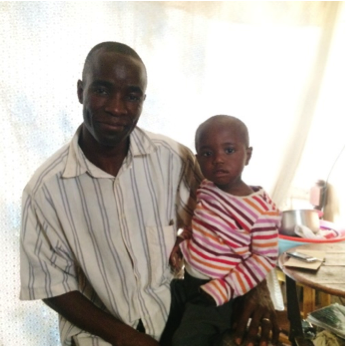 Nutrition can make a huge difference in a child’s health. In Kibera, where preventable diseases like severe diarrhea are common, having a strong developmental foundation through nutrition is an essential aspect of both individual and community health. That’s why CFK founded the Lishe Bora Mtaani Nutrition Center.
Nutrition can make a huge difference in a child’s health. In Kibera, where preventable diseases like severe diarrhea are common, having a strong developmental foundation through nutrition is an essential aspect of both individual and community health. That’s why CFK founded the Lishe Bora Mtaani Nutrition Center.
Since the Nutrition Center opened in May of 2013, Community Health Workers have reached 4,195 children through door-to-door screenings for malnutrition, of which 193 have been admitted to the center’s feeding and education program. The center was founded with the purpose of reducing the rates of severe acute malnutrition in Kiberan children under five years old by 50%. Truly reducing malnutrition in children requires getting them the right nutrients every day, especially after leaving the center. Staff members at the center work to bring children back to full health, but also teach families how to keep their children healthy through workshops on smart shopping and nutrition classes. Children also participate in educational and social skill-building activities. Each child gets the care and treatment they need to make a full recovery.
In August of 2013, one of those children—Prince Enock—was admitted to the Nutrition Center for symptoms of malnutrition. Over a year later, Maryanne, a CHW, and I weaved through the streets of Kibera on our way to Prince’s house for a follow-up appointment with him. Patrick and Philomena, Prince’s parents, welcomed us into their home to talk about the progress Prince has made since leaving the center and the impact the program has had on their family.
Prince was admitted to the center after CHWs asked to screen their household during a routine door-to-door visit. When measuring Prince’s arm, they discovered that his growth patterns were indicative of severe acute malnutrition. The CHW referred Prince to CFK’s Tabitha Clinic who then referred the family to the center. At the Nutrition Center, the staff focused on getting Prince back to full health, using methods that included adding micronutrients to his food. Prince’s three month tenure at the center, which began when he was nine months old, helped his weight increase from 6.1 (about 13.5 lbs.) to 8.4 kilograms (about 18.5 lbs.), which put him back on the right track!
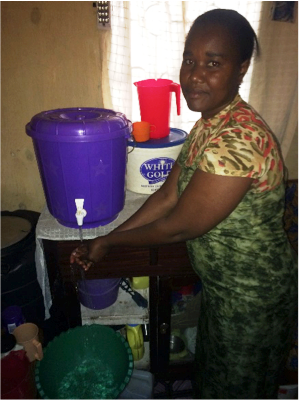 When I asked Philomena about the greatest change she has noticed in Prince after his discharge from the center, she stated that there was a large increase in his appetite, which she attributes to his continued health. His parents, both teachers, also said that he continued to grow in weight and height, which they consider positive outcomes as well.
When I asked Philomena about the greatest change she has noticed in Prince after his discharge from the center, she stated that there was a large increase in his appetite, which she attributes to his continued health. His parents, both teachers, also said that he continued to grow in weight and height, which they consider positive outcomes as well.
The family—which includes Prince’s siblings Ephraim (age 7) and Ester (age 5)—are also recipients of a hand-washing station through CFK’s hand-washing installation initiative, a collaboration with Ronald McDonald House Charities that aims to bring clean and easy-to-use hand-washing facilities directly to Kiberan households. Their interaction with both programs has improved their hygiene behaviors in the household. “We used to boil water, but we did not have a facility to draw clean water from,” explained Patrick. Philomena noted that with the proper container and training, the water they drink is “not contaminated” and is now “clean.” When I asked Patrick if he could say one thing about the nutrition and WASH programs, he stated “I want to commend them for assisting the children in the community.”
Rye Barcott's Blog
- Rye Barcott's profile
- 7 followers


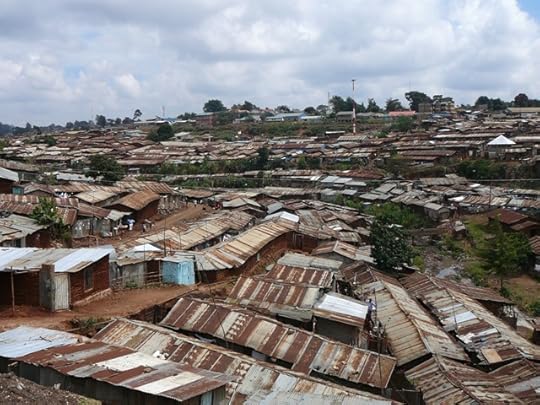
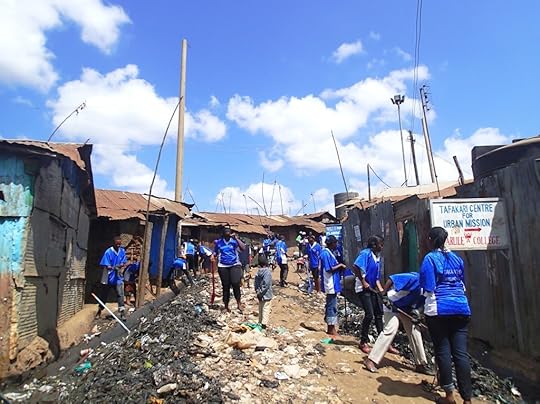
![Scholarship recipients [low quality]](https://i.gr-assets.com/images/S/compressed.photo.goodreads.com/hostedimages/1426354004i/14005211._SX540_.jpg)
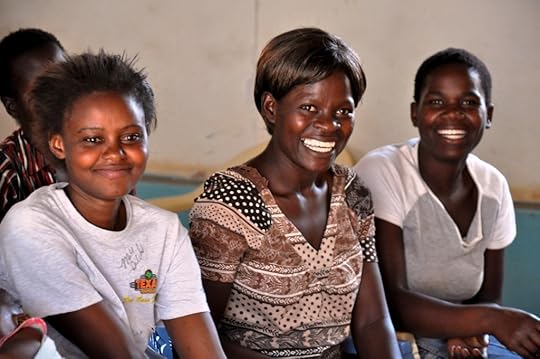

![DSC_0425 [re-size]](https://i.gr-assets.com/images/S/compressed.photo.goodreads.com/hostedimages/1423279803i/13603682._SX540_.jpg)

